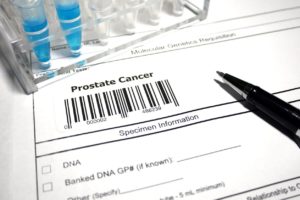
Exploring the Fatalities of Prostate Cancer
There’s good news for men diagnosed with prostate cancer — it has one of the highest survival rates of all cancer types. Thanks to early
HIPAA Alert: Potential Data Breach Learn More
Questions on Oncology, Hematology and/or Infusion Clinical Services due to COVID-19 Crisis – CALL 833-698-1623
Important Information for Our Patients Regarding the Coronavirus.
RCCA Providing Area Cancer Patients with Access to Care During Coronavirus Outbreak
RCCA Offering Patients Virtual Visits During Coronavirus Pandemic
Prostate cancer is among the most common cancer types for men in the United States. Like other cancers, it rarely presents symptoms in its early stages. Understanding the signs is important since early detection provides the best chances for a full recovery.
Regional Cancer Care Associates (RCCA), one of the nation’s largest networks of cancer specialists, treats a wide variety of cancers and blood disorders. RCCA specializes in providing the latest therapies for prostate cancer, serving patients in New Jersey, Connecticut, Massachusetts, and the Washington, D.C., area. Learn more about prostate cancer symptoms and detection at RCCA.
Prostate cancer is a cancer that starts in the prostate, a gland that is part of the male reproductive system. Cancer is characterized by disordered cell growth. Under normal conditions, cells reproduce at the same rate at which old ones die. Cancerous cells, however, reproduce without control. This creates a constantly growing tumor that may spread to other parts of the body.
Prostate cancer is one of the most common types of cancer. According to the American Cancer Society, an estimated 313,680 new cases of prostate cancer are diagnosed annually, and about one in eight men will be diagnosed with prostate cancer in his lifetime. The cause is still unknown. There are, however, a few known risk factors that can increase a person’s likelihood of developing prostate cancer. They include:
A man with one or more of these risk factors should consider regular prostate cancer screenings. Early discovery is essential to a successful treatment. The sooner prostate cancer is diagnosed, the more treatment options are available and the more effective they may be.
Symptoms of prostate cancer depend on its stage. In general, more advanced prostate cancer exhibits more and stronger symptoms. Following is a breakdown of the potential signs at each stage.
It is important to note that the many individuals who experience one or more of the symptoms will not have prostate cancer. Nonetheless, it is important to consult a physician about these symptoms, particularly if they are pronounced, arose suddenly, or have persisted for an extended period. Prompt evaluation will enable a doctor to address your concerns and to provide a treatment plan for whatever condition may be responsible for the symptoms.
Many people with early-stage prostate cancer display no symptoms. Frequently, the only means of detecting cancer is through routine screening.
Most symptoms of prostate cancer begin appearing at Stage III. One common sign is a change in bathroom habits. Due to the prostate’s location in the body, a growing tumor can put pressure against the bladder and urethra. This may result in the following changes:
Prostate cancer may also affect a person’s sexual ability. The prostate gland plays a role in producing semen, which may carry cancer cells into the penis. This may interfere with normal sexual function. The following signs may be indicators of an underlying issue such as cancer:
Metastatic prostate cancer means the cancer has spread into other areas of the body. At this stage, individuals may experience symptoms in the parts of the body that are newly affected. Bone is the most common site for prostate cancer metastasis. Here, it may cause pain in the pelvis, hips, or spine. Fractures are also common if metastatic cancer compromises bone strength. Metastatic cancer may also press against nerves, resulting in pain, numbness, or weakness in the limbs. Fatigue and unexpected weight loss are also frequent symptoms.

Many symptoms of prostate cancer are also associated with other, more common conditions. For example, frequent urination or a slow urine stream are often signs of benign prostatic hyperplasia (BPH). This is a non-cancerous enlargement of the prostate that is common in older individuals. Erectile dysfunction, meanwhile, is more frequently caused by vascular or psychological conditions than by prostate cancer.
Because of this overlap, people should not panic when they experience new symptoms. They should, however, consult with a physician to determine their cause. An early and accurate diagnosis is important to treating any health condition, especially prostate cancer.
Routine screenings are also important for detecting cancer that is not yet symptomatic, in addition to cancers that develop in individuals who may not notice symptoms due to other health conditions. People at average risk are typically encouraged to begin routine screenings at age 50. Those who are at elevated risk should begin at age 45, while those with multiple first-degree relatives who have had prostate cancer should begin at age 40.
For those diagnosed with prostate cancer, Regional Cancer Care Associates (RCCA) can help. RCCA is a group of more than 100 medical oncologists and hematologists who treat patients who have solid tumors, blood-based cancers and benign blood disorders. They strive to educate patients while providing innovative care and cutting-edge diagnostics close to home. Learn more about prostate cancer symptoms and detection at RCCA.
What are the early signs of prostate cancer?
Most cases of prostate cancer do not display symptoms in the earliest stages. This early, the only reliable means of detection is with routine screening.
What are the symptoms of advanced prostate cancer?
Mid- to late-stage prostate cancer often causes changes in bathroom habits. Urination may be slow, difficult, or painful, and there may be blood in urine. People may also experience frequent urination or changes in bladder control. Prostate cancer also often causes sexual difficulties, including erectile dysfunction, painful ejaculation, less ejaculated fluid than usual, and blood in semen.
Metastatic prostate cancer is cancer that has spread to other parts of the body, like the bones or lymph nodes. It can cause bone pain, weight loss, fatigue, lower body swelling, and neurological symptoms.
When should men start getting screened for prostate cancer?
The ideal age for routine prostate cancer screening is individual and dependent on the individual’s level of risk. Most recommendations are as follows:
People should speak with their primary care physician about their prostate cancer risk and when to start prostate cancer screening.
What treatments are available for prostate cancer?
The appropriate treatment for prostate cancer depends on a variety of factors, including cancer stage, hormonal factors, and the patient’s overall health condition. People with prostate cancer symptoms can find the medical attention they need at Regional Cancer Care Associates. RCCA specialists provide care to more than 30,000 new patients and 265,000 established patients each year. RCCA physicians offer patients innovative therapies, including immunotherapies and targeted therapy, cutting-edge diagnostics as well as access to approximately 300 clinical trials in community-based centers close to home.
What types of cancer are treated at RCCA?
RCCA has expertise in handling all types of cancer, including prostate, breast, lung, and colon cancer. We also treat a variety of blood disorders.
If you have been diagnosed with prostate cancer, the expertise you need can be found at Regional Cancer Care Associates. Your treatment plan will entail the latest and most advanced treatment methods and techniques available. For more information, contact one of our locations or call our headquarters at 844-346-7222.

There’s good news for men diagnosed with prostate cancer — it has one of the highest survival rates of all cancer types. Thanks to early

When dealing with a serious illness, like prostate cancer, patients and their families are faced with a lot of physical, emotional, mental, financial and spiritual

When you’re diagnosed with prostate cancer, life can start changing very rapidly. There will be new physical and emotional burdens you never thought you’d have

Regional Cancer Care Associates is one of fewer than 200 medical practices in the country selected to participate in the Oncology Care Model (OCM); a recent Medicare initiative aimed at improving care coordination and access to and quality of care for Medicare beneficiaries undergoing chemotherapy treatment.